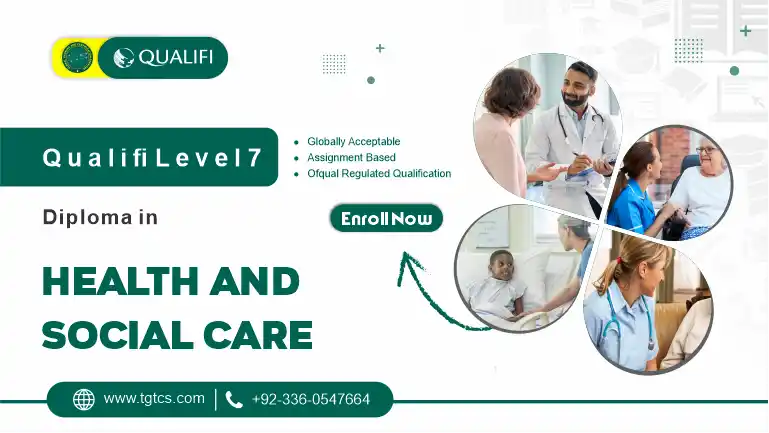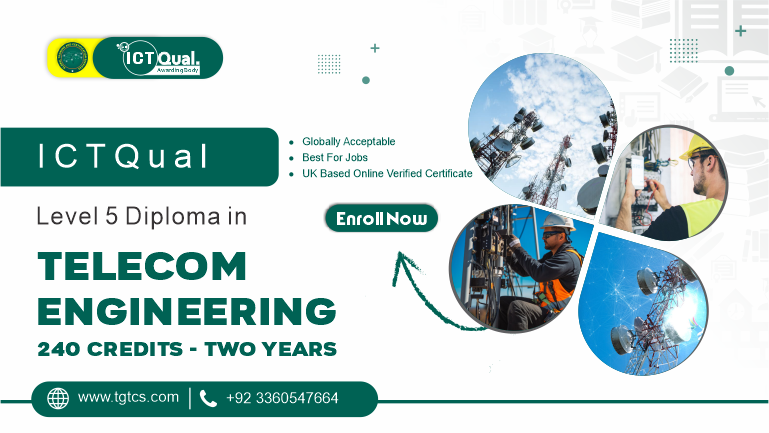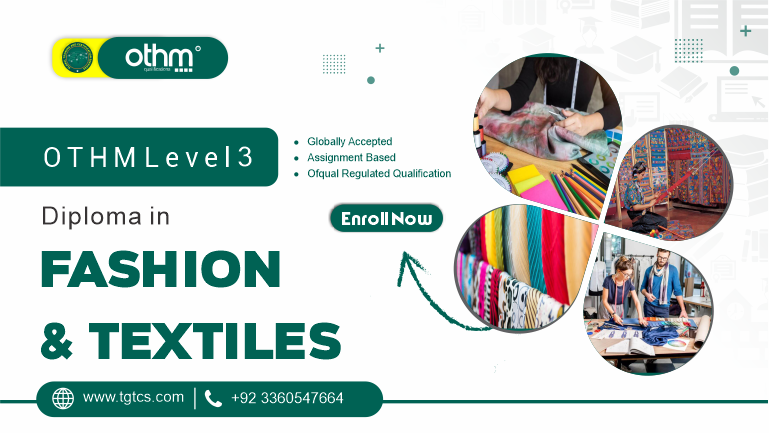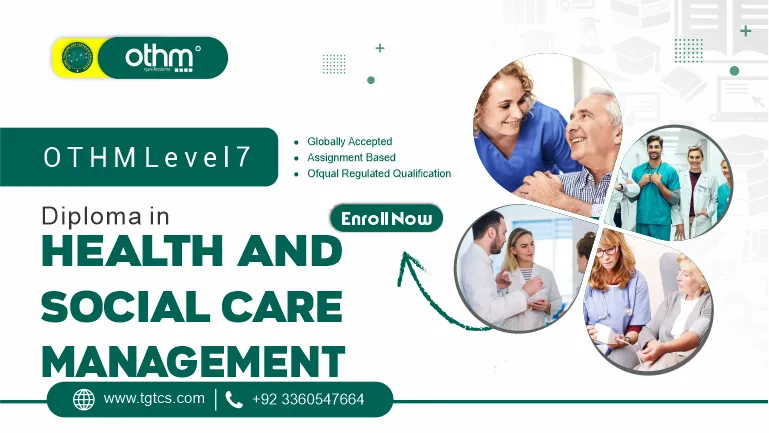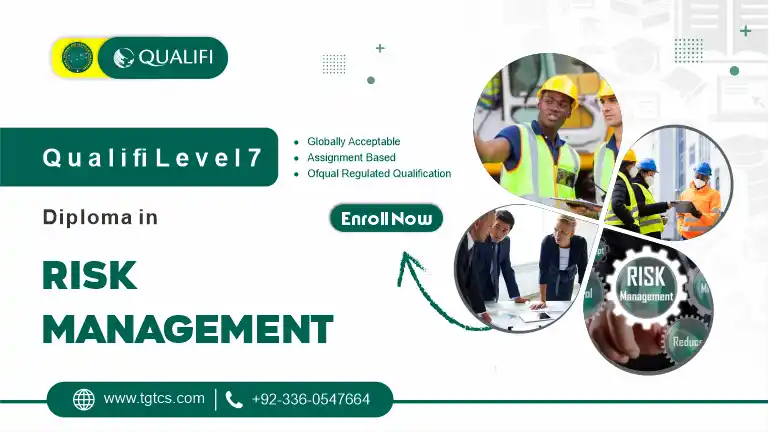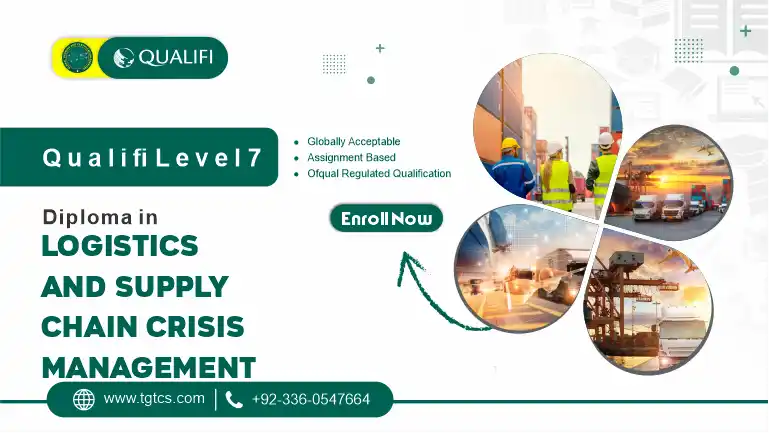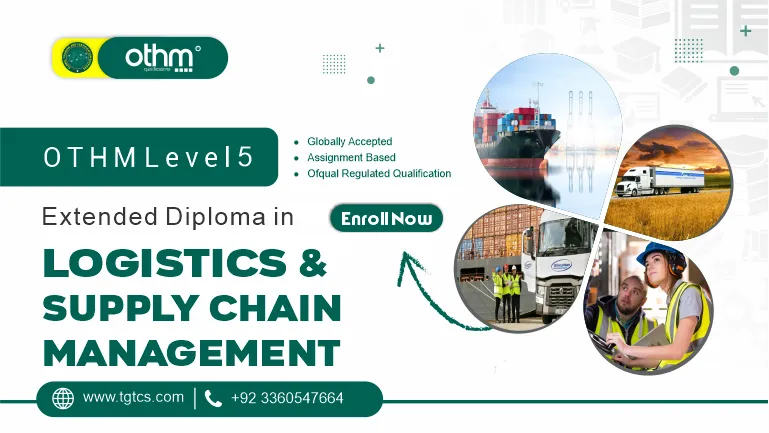Qualifi Level 7 Diploma in Health and Social Care
Take your career to new heights while enhancing workplace safety. Discover the art of fostering a secure and healthy work environment.
In an era where healthcare and social care systems are undergoing rapid transformation, the demand for skilled professionals who can navigate these changes and lead with expertise is greater than ever. The Qualifi Level 7 Diploma in Health and Social Care stands out as a pivotal qualification for those aspiring to make a significant impact in these critical fields.
This advanced diploma offers a pathway to mastering leadership and strategic skills required to excel in health and social care management. Let’s delve into the benefits and opportunities this diploma provides.
The Qualifi Level 7 Diploma in Health and Social Care is a prestigious postgraduate qualification designed to enhance the skills and knowledge of professionals in the health and social care sectors.
It equips learners with advanced management and leadership capabilities essential for overseeing complex care systems, improving service delivery, and driving strategic change within organizations.
With this diploma, you position yourself for high-level roles such as Director of Care Services, Health Care Manager, Social Care Consultant, and Policy Advisor. It’s an excellent credential for those looking to progress into senior leadership or specialized roles within the sector.
The Qualifi Level 7 Diploma in Health and Social Care offers a transformative opportunity for professionals in the sector to enhance their leadership and strategic capabilities. By providing advanced knowledge, practical skills, and a global perspective, this diploma prepares you to tackle the challenges of modern health and social care systems and drive meaningful improvements in service delivery.
If you’re ready to take the next step in your career and make a substantial impact in the health and social care fields, the Qualifi Level 7 Diploma is a powerful tool to help you achieve your goals and advance to new heights in your professional journey.
The Global Training and Certification Services (tgtcs) is Offering All Qualifi Certifications in Association with Inspire College of Technologies Uk (ICTQual).
The Qualifi Level 7 Diploma in Health and Social Care is an advanced postgraduate qualification designed for professionals seeking to enhance their expertise in health and social care management.
This diploma equips learners with the strategic and leadership skills necessary to excel in high-level roles within the sector. The curriculum covers key areas such as strategic management, leadership, policy development, and quality assurance, providing a comprehensive understanding of complex care systems and service improvement.
Ideal for experienced managers, aspiring leaders, and policy makers, this diploma prepares graduates for senior positions, including Health Care Director, Social Care Manager, and Health Policy Advisor.
The program combines theoretical knowledge with practical application, ensuring that participants are well-prepared to address contemporary challenges and drive effective change in health and social care settings.
Mandatory Units
- Health and Social Care Leadership
- Managing People in Health and Social Care
- Managing Finance in Health and Social Care
- Health and Social Care Strategies and Policies
- Leading Change in Health and Social Care
- Research Methods for Healthcare Professionals
Upon completing the Qualifi Level 7 Diploma in Health and Social Care, learners will achieve the following learning outcomes:
- Advanced Strategic Management Skills: Develop and implement effective strategic plans to enhance organizational performance and service delivery within health and social care settings.
- Leadership and Change Management: Demonstrate advanced leadership capabilities, including managing teams, driving organizational change, and fostering a culture of continuous improvement.
- In-Depth Understanding of Policy and Governance: Apply knowledge of health and social care policies, regulations, and governance frameworks to ensure compliance and enhance service quality.
- Quality Assurance and Service Improvement: Design and implement quality assurance processes and improvement strategies to maintain high standards of care and service delivery.
- Ethical and Legal Competence: Address complex ethical and legal issues in health and social care, ensuring that services are delivered in a manner that upholds ethical standards and legal requirements.
- Strategic Decision-Making: Utilize data and insights to make informed strategic decisions that improve organizational effectiveness and patient outcomes.
- Global and Sector Trends: Analyze and apply global best practices and emerging trends in health and social care to develop innovative solutions and strategies.
- Effective Communication and Stakeholder Engagement: Develop and implement strategies for effective communication and engagement with stakeholders, including patients, families, and healthcare professionals.
- Research and Evidence-Based Practice: Conduct and apply research to inform practice, support decision-making, and drive evidence-based improvements in health and social care services.
- Enhanced Professional Practice: Reflect on and apply advanced management theories and practices to enhance personal effectiveness and professional practice within the health and social care sectors.
Some benefits of this course are:
- Advanced Leadership Skills: Gain critical leadership and management skills necessary for overseeing complex care systems and driving strategic change within health and social care organizations.
- Strategic Expertise: Develop the ability to create and implement effective strategic plans that enhance service delivery, optimize organizational performance, and meet the evolving needs of the sector.
- Comprehensive Knowledge: Acquire in-depth understanding of key areas including policy development, governance, quality assurance, and ethical issues, preparing you to address diverse challenges in health and social care.
- Career Advancement: Position yourself for high-level roles such as Health Care Director, Social Care Manager, or Policy Advisor. The diploma enhances your credentials and opens doors to senior leadership positions and specialized roles.
- Practical Application: Benefit from a curriculum that emphasizes real-world application through case studies, projects, and practical assignments, ensuring that the concepts learned are directly applicable to your professional practice.
- Global Perspective: Understand and apply global best practices and emerging trends in health and social care, equipping you with the knowledge to address international and cross-cultural challenges effectively.
- Improved Service Quality: Learn to implement quality assurance processes and continuous improvement strategies that ensure high standards of care and enhance patient and service user satisfaction.
- Ethical and Legal Proficiency: Develop expertise in navigating complex ethical and legal issues, ensuring that care services are delivered in accordance with ethical standards and legal requirements.
- Enhanced Research Skills: Gain the ability to conduct and apply research to inform practice, support evidence-based decision-making, and drive improvements in health and social care services.
- Networking Opportunities: Connect with fellow professionals, industry experts, and academic mentors, expanding your professional network and gaining valuable insights and opportunities in the health and social care sectors.
- Flexible Learning Options: Benefit from flexible study options, including part-time and online formats, allowing you to balance your professional and personal commitments while pursuing advanced qualifications.
The Qualifi Level 7 Diploma in Health and Social Care is designed for a specific profile of professionals who are seeking to advance their careers in the health and social care sectors. The ideal learner for this course typically possesses the following attributes:
- Experienced Professionals: Individuals with substantial experience in health or social care roles, including those currently in management or leadership positions, who are looking to deepen their expertise and advance to senior roles.
- Current Managers and Leaders: Existing managers, directors, and leaders within health and social care organizations who wish to enhance their strategic and leadership skills, improve service delivery, and drive organizational change.
- Aspiring Senior Leaders: Professionals aiming to move into high-level roles such as Health Care Director, Social Care Manager, or Policy Advisor, and who seek to build a strong foundation in strategic management and leadership.
- Policy Makers and Consultants: Those involved in shaping health and social care policies or providing consultancy services, who need advanced knowledge of governance, policy development, and strategic planning.
- Dedicated Lifelong Learners: Individuals committed to continuous professional development and who are eager to stay updated with the latest trends, best practices, and innovations in health and social care.
- Strategic Thinkers: Professionals who are comfortable with data analysis and strategic planning, and who are interested in utilizing these skills to address complex challenges and improve service quality.
- Ethical and Committed Practitioners: Those who are deeply committed to ethical practice and delivering high-quality care, and who are motivated to uphold and advance standards in health and social care services.
- Global Perspective Enthusiasts: Learners interested in understanding and applying global best practices and addressing international and cross-cultural challenges within health and social care settings.
- Problem Solvers: Individuals who enjoy tackling complex issues, working on real-world case studies, and applying advanced theories and practices to practical situations in their professional roles.
- Flexible Professionals: Those who can balance their current professional responsibilities with academic commitments, as the course offers flexible learning options to accommodate busy schedules.
Progression Route
- Advance Your Education: Seamlessly transition to a master’s degree at a leading university, leveraging your Level 8 qualifications to deepen your expertise and enhance your academic credentials.
- Expand Your Professional Horizons: Step into influential roles within related professions, applying your advanced strategic management and leadership skills to drive innovation, lead teams, and make impactful decisions.
Course Overview
Course Level
Level 7
Course Units
6 mandatory Units
Duration
6 to 12 Months
